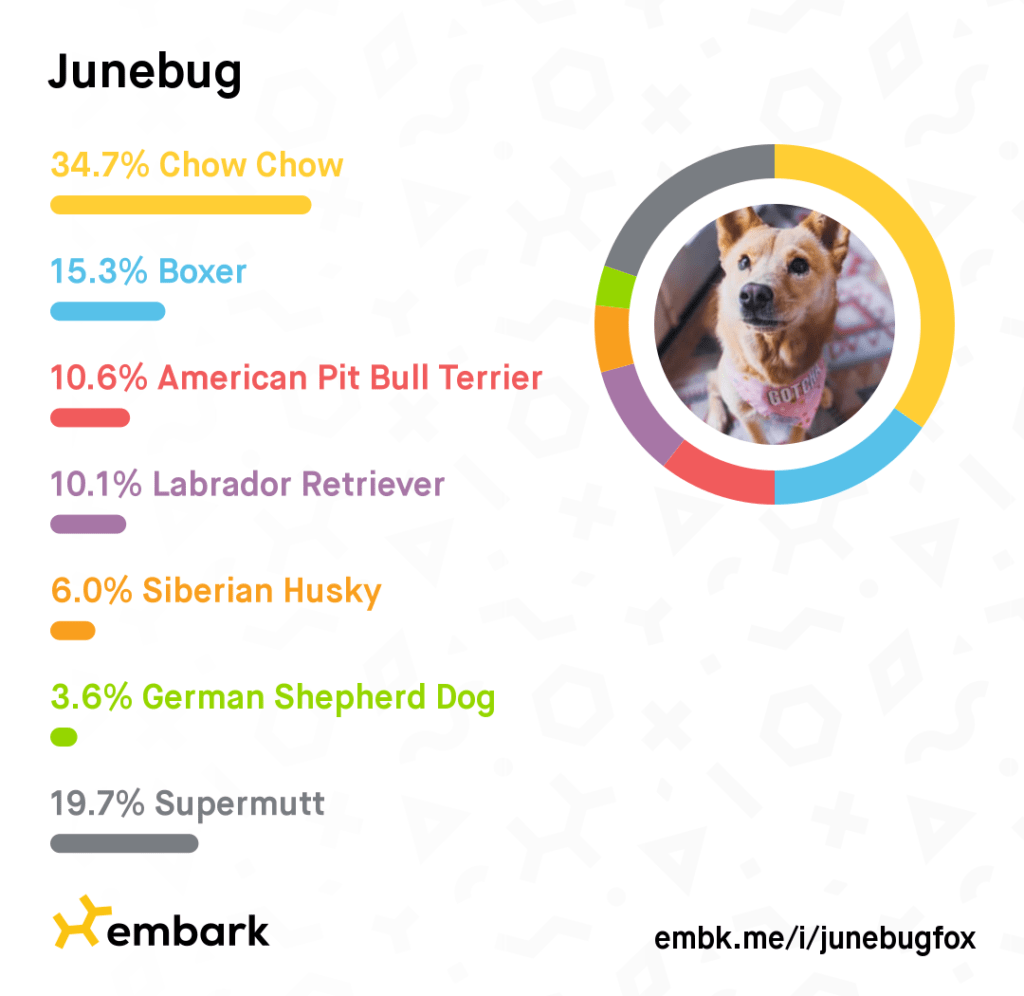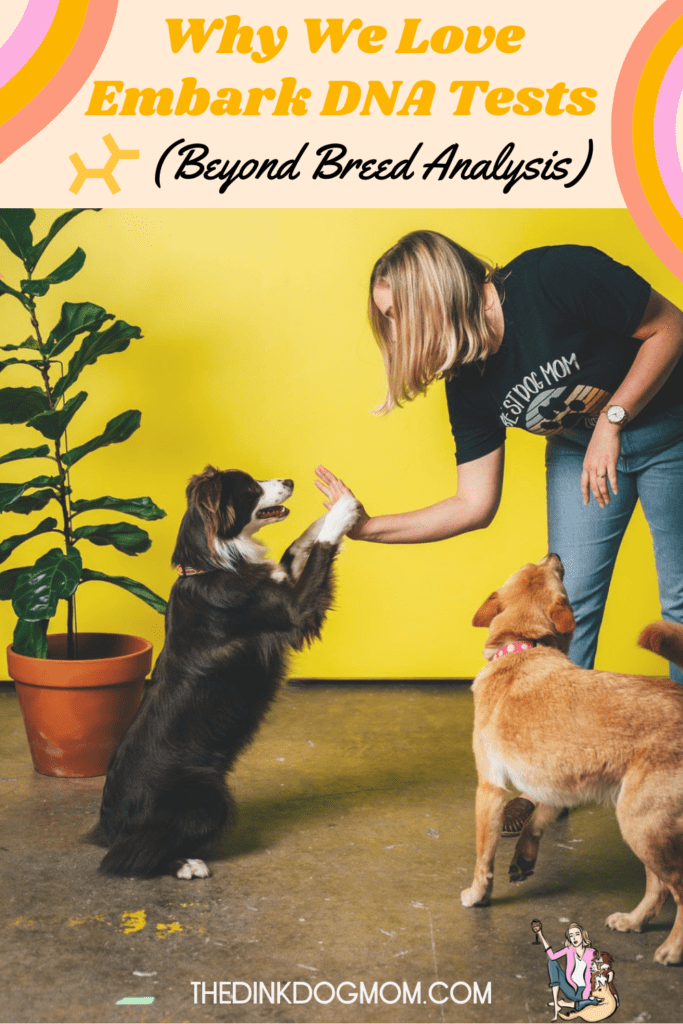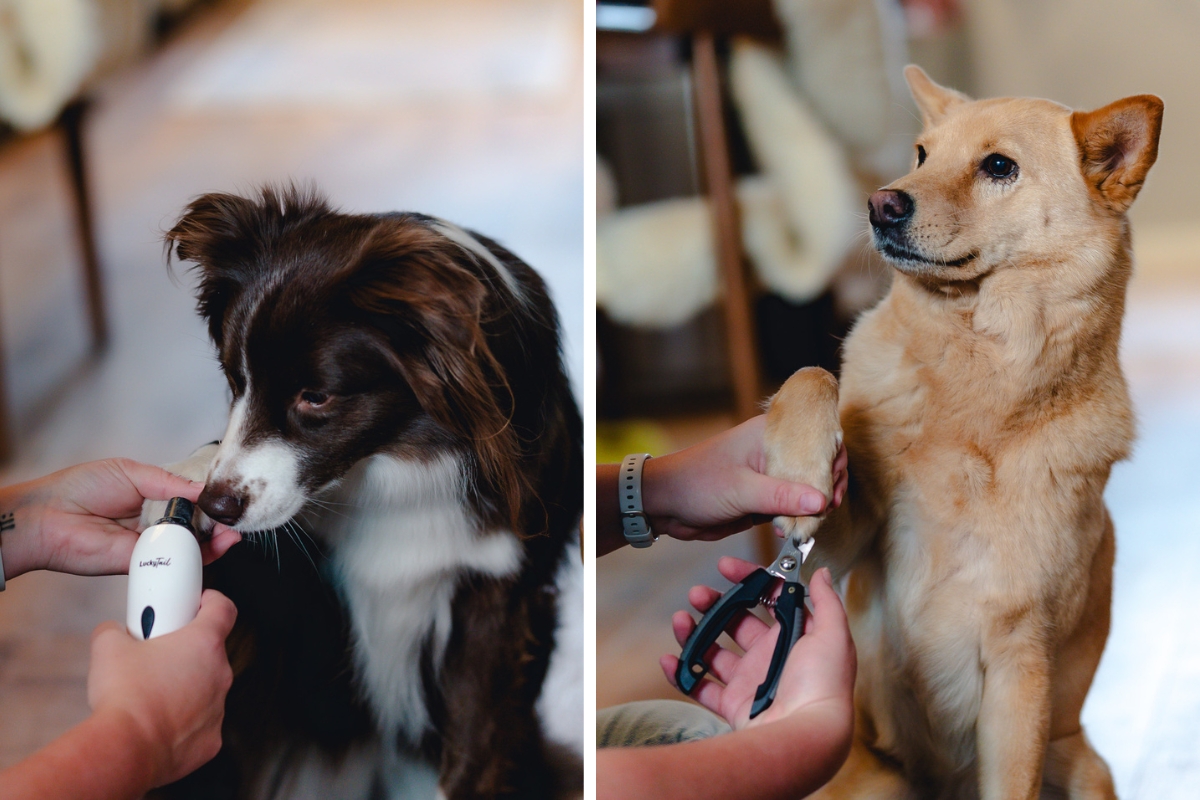When we first brought Junebug home, we couldn’t help but wonder what her breed mix was. The shelter in Harlingen, where June was picked up as a stray, had labeled her a “shepherd mix.” We thought she looked a lot like a Shiba Inu. Others guessed Chow Chow, Finnish Spitz, husky, and red heeler. Driven by curiosity, we decided to get June an Embark DNA test to shed some light on this little fox dog from the border.
If I had to guess, I would say most people get a dog DNA test to figure out the breed(s) of their rescue dog. This is certainly why we tried an Embark DNA test for the first time. However, when we brought Margot home, I really wanted to get her DNA tested, too, even though we were confident she was a purebred Australian Shepherd. She was, after all, surrendered by a retiring breeder. So, why did I want to do a DNA test for my purebred dog?
For one, we didn’t know Margot was a purebred dog. We have no information on her parents, and she didn’t come with papers. Secondly, and more importantly, pure bred does not mean well bred. I knew nothing about her health. Australian Shepherds, like many pure bred dogs, have a lot of genetic health concerns. While an ethical breeder will health test breeding prospects to avoid passing down genetic health problems, backyard breeders do not. An Embark + Breed and Health kit was a relatively inexpensive way to get a little more information on Margot’s health and genetic history.
Although getting your dog DNA tested is definitely a lot of fun, the results provide invaluable insight into how you can give your dog a happy, healthy life! I’ll share how Embark worked, what we learned, and how I have used this knowledge to better meet the needs of my dogs.
*Disclosure: This post contains affiliate links. This means that I may earn a small commission, at no additional cost to you, if you make a purchase. Thank you for supporting my blog! I only recommend products I use myself, and all opinions expressed here are my own. Read my full disclosure here.“
How the Embark DNA Test Works
Embark DNA Tests are incredibly easy to use. The kit arrives pretty quickly and has very clear instructions for what to do.
First, you swab the cheek pouch of your dog’s mouth for about 30-60 seconds to soak it in saliva. Be sure to do this before your dog eats to avoid contaminating the sample. Next, screw the swab into the little case it has, shake for a few seconds, and then send it back to Embark in the pre-paid shipping envelope.
Once you’ve dropped the swab in the mail, go online to embark.com and create an account and profile for your dog. Each kit has a unique activation code that will tie the sample you sent in to your dog. This means you can also test more than one dog at a time and easily keep the results separate. Fill out as much information for your dog’s profile as you can. All of the surveys you answer provide invaluable information for Embark’s research on dogs, which I think is really cool!
It usually takes about 2-4 weeks for your Embark DNA test results to come in, depending on how “complicated” your dog’s DNA is to unravel. In the meantime, Embark keeps you fully updated at every step. You’ll get confirmation when they receive the sample, as well as frequent updates while they process it. Finally, once your results are in, you’ll get a fun breed reveal email.

Is an Embark DNA Test Accurate?
Yes! The Embark health tests are 99.99% accurate! For identification of breeds, Embark uses research grade microarray technology to analyze over 200,000 genetic markers! They test back to at least 3 generations and sometimes even further to breeds contributing as little as 5% of a dog’s genome. They are incredibly transparent about their methodology, which you can read more about on their website.
I also like that Embark partners with Cornell University College of Veterinary Medicine. Together, they developed a customized SNP Microarray which enables them to test and provide results for hundreds of genetic health markers and traits. It also creates “research-ready data” that can be used by canine health organizations and scientists. Per their website, “The core of [Embark’s] platform has now been used to test hundreds of thousands of dogs at Embark, and over a hundred thousand more by scientists at university laboratories throughout the world.”
What does this mean? It means Embark provides the highest possible accuracy of results for dog DNA tests! It also offers the greatest potential to make future genetic discoveries. These discoveries help us better understand dog health, and can provide insight on the best ways to help our dogs live long, healthy lives!
Our Embark Breed + Health Kit Results (and how we used them)
June’s results took almost twice as long as Margot’s to come in, probably because her genetics were a little more complicated. We learned that she was mostly Chow Chow, Boxer, and Pitbull, with a little lab, husky, and German Shepherd mixed in (so the shelter wasn’t wrong about the Shepherd mix after all 😂). This breed mix was surprising because June was so small! However, it really helped shed a little light onto her personality, which definitely has the independence of a spitz breed! We also learned that June was not at an increased risk for any of the genetic health conditions Embark tests for.
Margot, of course, turned out 100% Australian Shepherd. This did answer one big question for us: was she Australian Shepherd, or was she a Mini American Shepherd?
How Embark’s Dog Breed Analysis Can Help Your Dog


While learning your dog’s breed makeup is really fun, there are also concrete benefits to having this information. Breed can heavily shape your dog’s personality. This is because dog breeds have very specific instincts and drives. For example, herding breeds like Border Collies or Australian Shepherds have a genetic predisposition to nipping and herding; terrier breeds, like Jack Russells, can have really intense prey drive.
Understanding these general breed characteristics can provide tremendous insight when it comes to training your dog. For one, it can shed a little light on why your dog behaves the way it does. This can also help when addressing behavior problems, as it can separate instinct from learned behavior. Secondly, knowing your dog’s breed(s) could give you ideas for the best way to fulfill your dog’s needs! If you find out you have a beagle mix, you might try scent work; if you have a lab mix, perhaps water sports are in your future.
June came back with an interesting mix of Spitz breeds, like Chow Chow and Husky. Spitz breeds are typically loyal, intelligent, and affectionate, but also independent and bold. This really helped shaped the way I approached training with June, who is very different from the puzzle-solving dog that Margot is.
How Embark’s Health Analysis Can Help Your Dog


While June’s breed reveal was the most interesting part of her results, Margot’s breed panel was pretty straight forward. However, her results did provide us with critical health information. Namely, it revealed she had an increased risk for MDR1. This is a sensitivity to certain drugs, notably the parasiticide ivermectin as well as certain gastroprotectant and anti-cancer medications. This is incredibly important for both us and our vet to know!
Margot’s test results also showed her baseline ALT level was low normal. ALT is used by veterinarians to monitor liver health. This genetic variant means her average resting ALT activity is lower than normal. What does that mean exactly? An increase in her ALT activity could be evidence of liver damage, even if it is within normal limits by standard ALT reference ranges.
All of this information is invaluable when it comes to the health of your dog. Happily, Embark makes it easy to provide these results to your vet. You can either email the results straight from your dog’s profile, or print them out to deliver in person.
Finding Family with Embark DNA Test
In addition to learning about your dog’s breed and genetic health, there are a lot of other things you learn that are really fun! My favorite is the “Relatives” tab where you find your dog’s genetic relatives. These relatives are identified through an analysis of how much DNA your dog shares with another dog. Some people have even found their dog’s littermates through Embark!
As more people DNA test their dogs, Embark will update you on new relatives that are discovered. This is one of my favorite parts about the Embark DNA test, and it’s a big reason why I chose Embark over their competitors.
Is Embark Worth It?
Yes! Although the Embark Breed + Health Kit is priced at $199, it is almost always $50 off. This brings the cost to $149. For comparison, a blood panel test at our vet costs around $200. Although I’m not saying the DNA test is cheap, I do think it is a relatively cheap way to gain vital insights into your dog’s personality and health. In turn, these insights equip you with the knowledge you need to give your dog a happy, healthy life.
While I definitely think it’s worth the extra cost to get the Breed AND Health kit, you can purchase just the Embark breed identification kit for $129. While you will lose the health insights, you still get a thorough break down of your dog’s breed and can still connect with their genetic relatives.
So, if you are on the fence about whether or not you should get an Embark DNA test for your dog, I say go for it! Rescue dogs come to us as mysteries, and Embark gives us the chance to shed a little light on their past to ensure they have a happy, healthy future.







